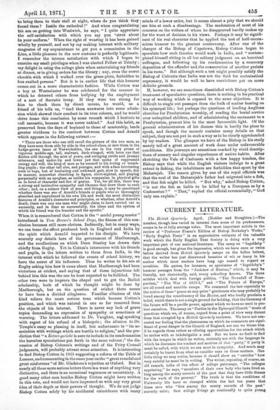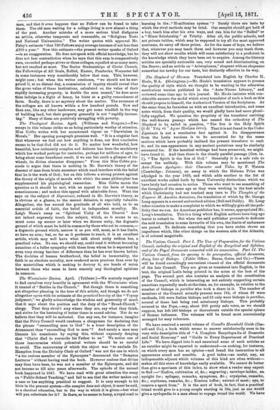CURRENT LITERATURE.
The British Quarterly. April. (Hodder and Stoughton.)—The number, though less varied in interest than some of its predecessors, seems to be of fully average value. The most important article is the review of "Professor Fraser's Edition of Bishop Berkeley's Works." "Early English Texts" is an appreciative estimate of the valuable work which the Early English Text Society is doing with a very important part of our national literature. The essay on " Ingoldsby " is good enough, but gives the impression, which we have once or twice before derived from British Quarterly essays on the belles letters, that the writer has just discovered beauties of wit or fancy in his author which most readers have long ago ceased to regard as novelties. He quotes, for instance, as specimens of " Ingoldsby's " humour passages from the "Jackdaw of Rheims," which, it may be literally, not rhetorically, said, every schoolboy knows. The three articles which deal with foreign politics, "The Downfall of Bona- partism," "The War of 1870-1," and "The Future of Europe," are all sound and sensible essays. We commend the last especially to the notice of those " peace- at-any-price " gentlemen who may probably be found among the constituency of the Review, and who loudly proclaim a belief, which there is not a single ground for holding, that the Germany of the future will be a pacific power, against which we have no need to pro- tect ourselves. The essay on "Parties in the Episcopal Church" treats of questions which we, of course, regard from a point of view very distant from that occupied by a British Quarterly reviewer. We have not con- cealed our feeling that the phenomena on which he comments are signi- ficant of great danger to the Church of England, nor can we blame him if he regards them rather as offering opportunities for the attack which he makes with so indefatigable a zeal. But we have no fault to find with the temper in which he writes, certainly not with the language in which he discusses the conduct and motives of that "party," if party it must be called, with which we are most in sympathy. And much may certainly be learnt from what an outsider says on these matters. One little thing we may notice, because it should show an " outsider " how very careful he must be in writing. The writer, repeating, of course, an old remark, talks of the effect of college patronage, "The colleges appointing," he says, "members of their own body who have lived so long among the musty records of the past that they have little fitness for the work of the present." The truth is that the conditions of University life have so changed within the last ten years that these men who "live among the musty records of the past' scarcely exist; that college livings go continually to quite young
men, and that it even happens that no Fellow can be found to take them. The old man waiting for a college living is now almost a thing of the past. Another mistake of a more serious kind disfigures an article, otherwise temperate and reasonable, on "Religious Tests and National Universities." The writer quotes with approval Mr. Paley's estimate " that 730 Fellows enjoy average incomes of not less than £300 a year." Now this estimate—the present writer speaks of Oxford —is an exaggeration. He does not speak with official knowledge, but he does not fear contradiction when he says that this sum is comparatively rare, exceeded perhaps at two or three colleges, equalled at as many more, but not reached at most. The Senior Studentships of Christ Church, the Fellowships of All Souls, Balliol, Exeter, Pembroke, Worcester fall in some instances very considerably below that sum. This, however, might pass ; but when the writer continues, "we should not be sur- prised if, at no distant day, a commission of inquiry should reveal that the gross value of these institutions, calculated on the value of their rapidly increasing property, is double the sum named," he does more than indulge in a flight of fancy, he hints at a guilty concealment of facts. Really, there is no mystery about the matter. The revenues of the colleges are all known within a few hundred pounds. Now and then one, like any other landowner, may get some windfall in the way of building land, but their property generally is not "rapidly increas- ing." Many of them are positively struggling with poverty.



































 Previous page
Previous page